
Backgammon is a member of the large family of tables games, which themselves date back nearly 5,000 years, although backgammon itself is just under 400 years old. Its immediate ancestor was the 16th-century game of Irish, the Anglo-Scottish equivalent of the French Toutes Tables and Spanish Todas Tablas, the latter being recorded by Alfonso X in his 1283 work, El Libro de los Juegos.
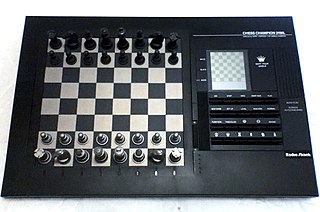
Computer chess includes both hardware and software capable of playing chess. Computer chess provides opportunities for players to practice even in the absence of human opponents, and also provides opportunities for analysis, entertainment and training.
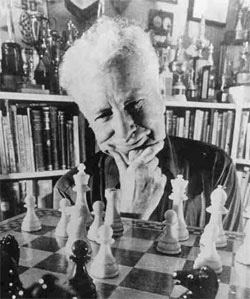
The Elo rating system is a method for calculating the relative skill levels of players in zero-sum games such as chess. It is named after its creator Arpad Elo, a Hungarian-American physics professor.

Shatranj is an old form of chess, as played in the Sasanian Empire. Its origins are in the Indian game of chaturaṅga. Modern chess gradually developed from this game, as it was introduced to Europe by contacts in Muslim Al-Andalus and in Sicily in the 10th century.
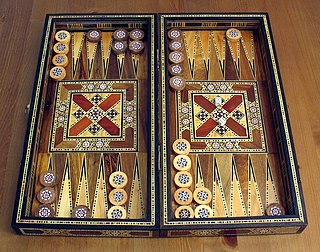
Tables games are a class of race game that includes backgammon and which are played on a tables board, typically with two rows of 12 vertical markings called 'points'. Players roll dice to determine the movement of pieces. Tables games are among the oldest known board games, and many different varieties are played throughout the world. They are called 'tables' games because the boards consist of four quadrants or 'tables'. Being race games, the tables board represents a linear race track with start and finish points, the aim being to be first to the finish line, but the characteristic features that distinguish tables games from other race games are that they are two-player games using a large number of pieces, usually fifteen per player. They should not be confused with table games which are casino gambling games like roulette or blackjack.

In computer chess, a chess engine is a computer program that analyzes chess or chess variant positions, and generates a move or list of moves that it regards as strongest.

Pokémon Puzzle League is a 2000 puzzle video game developed for the Nintendo 64 by Nintendo Software Technology based on Nintendo's Puzzle League puzzle games with Pokémon likenesses. It was released in North America in 2000, and in Europe in 2001. Gameplay is similar to Puzzle League, with much of the focus being on puzzle-based strategy in the game's grid-based format. To advance to new levels, players are required to advance through the game's trainers and gym leaders, similar to the ones featured in Pokémon Red, Blue, and Yellow. It is one of several Pokémon games to be based on the Pokémon anime, and features Ash Ketchum and other characters featured from the anime.
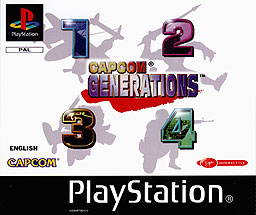
Capcom Generations is a series of five video game compilations produced by Capcom for PlayStation and Sega Saturn. Each volume contains three or four games from a particular series or game genre and were ported directly from their original arcade versions. Each disc also contains a "collection mode" featuring history, tips, artwork, character profiles, arranged music and other unlockable contents for each game. The PlayStation versions of the games also featured support for the DualShock controller.
The First Internet Backgammon Server (FIBS) began operating on July 19, 1992, allowing users to play backgammon in real-time against other people. It was hosted on the Internet, and could track player performance using a modified version of the Elo rating system.
PlayOK, also known as kurnik, is a website of classic board and card games to play online against live opponents in real-time. It was created in 2001 by Marek Futrega, and was initially a Polish-only website. As of early 2005 it supported over 30 board and card games, and the site is available in 33 languages so far.
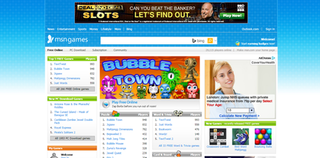
MSN Games is a casual gaming web site, with single player, multiplayer, PC download, and social casino video games. Games are available in free online, trial, and full feature pay-to-play versions.

Atari: 80 Classic Games in One!, known as Atari Anthology on consoles, is a video game collection developed by Digital Eclipse and published by Atari Interactive. The title is a compilation of 1980 video games previously published by Atari, Inc. and Atari Corporation, reproducing Atari's games from its arcade and Atari 2600 game console platforms. Many games permit one to play each title at varying speeds, with time limits, or with a shifting color palette.
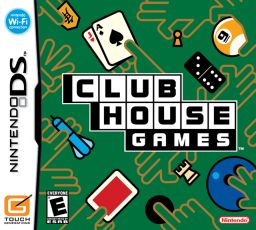
Clubhouse Games, known in some European countries as 42 All-Time Classics and in Japanese as Daredemo Asobi Taizen, is a compilation video game developed by Agenda and published by Nintendo for the Nintendo DS, consisting of board, card, and tabletop games from around the world. It was released in Japan on November 3, 2005, in Europe on September 29, 2006, in North America on October 9, 2006, and in Australia on October 26, 2006.

Phase is a music-themed iPod game created by Harmonix exclusively for the iPod click wheel interface. It is similar to other Harmonix games Amplitude and FreQuency.

Tap Tap Revenge, also known as Tap Tap Revenge Classic was a music game created by Nate True, and developed and published by Tapulous for iOS in July 2008. It is the first game in Tapulous' Tap Tap series. Development for the game began prior to the release of the iPhone SDK, and was originally entitled Tap Tap Revolution. The goal of the game is to tap each of the colored balls when they reach a line at the bottom of the screen. If the ball is hit on the beat, the player gains points, but if not, it counts as a miss. There are also "shakes", which require the player to move the iPhone, iPod Touch or iPad to the right, left, or middle.
Dynamic game difficulty balancing (DGDB), also known as dynamic difficulty adjustment (DDA) or dynamic game balancing (DGB), is the process of automatically changing parameters, scenarios, and behaviors in a video game in real-time, based on the player's ability, in order to avoid making the player bored or frustrated. The goal of dynamic difficulty balancing is to keep the user interested from the beginning to the end, providing a good level of challenge.
GameTable Online was a popular web game portal that specialized in online adaptations of board, card, and dice games. Their game platform offered both head-to-head play against other players or computer opponents for single player mode, including such games are checkers, chess, hearts (game), and Axis & Allies. There was a mix of free and "Premium" games. The "Premium" games were the most popular, and to play those against other humans required an activation fee per game title.

AlphaZero is a computer program developed by artificial intelligence research company DeepMind to master the games of chess, shogi and go. This algorithm uses an approach similar to AlphaGo Zero.

Ultimate Brain Games is an unreleased board video game that was in development by Teque London and planned to be published by Telegames on a scheduled Q2 1995 release date exclusively for the Atari Jaguar. The game was going to be a spiritual successor to Fidelity Electronics and Telegames's 1991 Atari Lynx title The Fidelity Ultimate Chess Challenge. It was also intended to be released the Atari Jaguar CD add-on and later on the PC.

Clubhouse Games: 51 Worldwide Classics, known as 51 Worldwide Games in Europe and Australia, is a party video game developed by NDcube and published by Nintendo for the Nintendo Switch. This game is a successor to Clubhouse Games (2005) for the Nintendo DS and is a compilation of board, card, tabletop, and toy sports games from around the world. It was released worldwide on June 5, 2020, and more than 3.14 million copies have been sold worldwide by April 2021.














